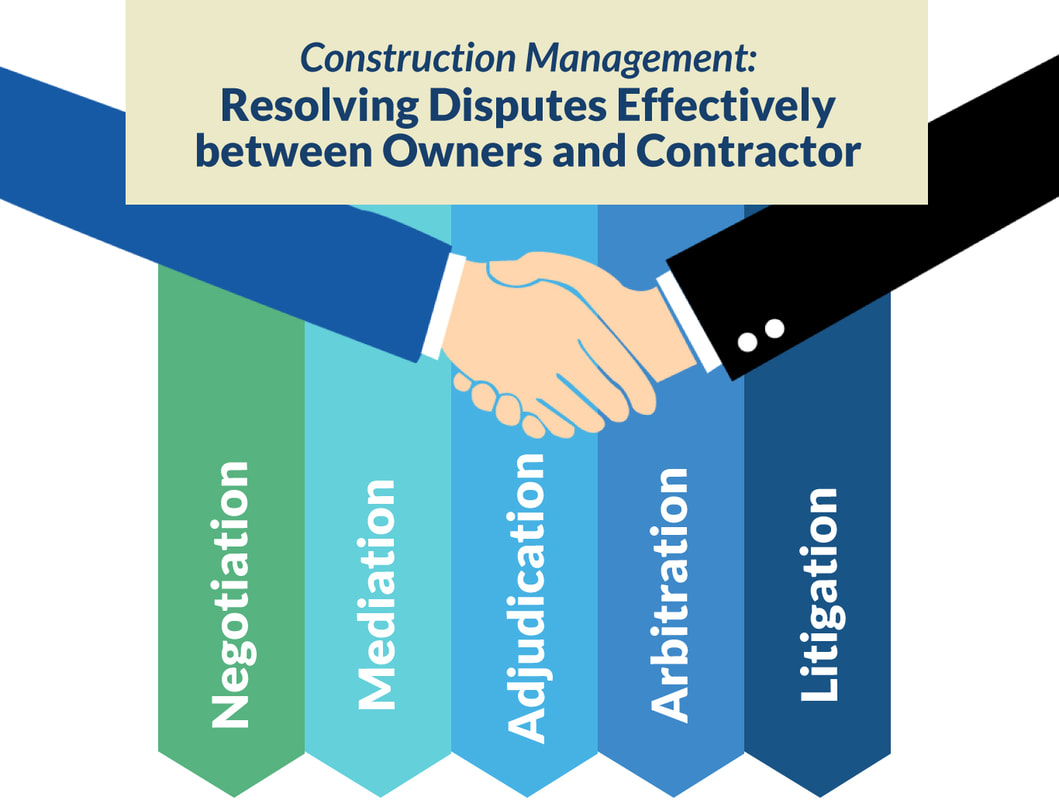From harmonious relationship to taking legal actions, what happened to your construction project?  Filing lawsuits against a contractor due to building disputes is a serious matter, and unfortunately it’s becoming more common. A long process awaits someone who prefers taking the situation to court. What is worse? The construction project is being compromised. Building process might be delayed or be completed with poor quality. Although some people assume disputes are inevitable on construction projects, establishing a systematic construction management process will help prevent the situation deteriorating and clients don’t have to suffer the crippling consequences of wasted time and additional money which often results from disputes. To effectively resolve disputes between owners and contractors it is recommended to try at least one of the dispute resolution methods: Negotiation The easiest among the rest. One can negotiate most simple situations. The goal is for the client and builder to agree an equitable and achievable resolution. Either one of the parties, or both parties, should take the initiative to discuss things in a clear logical manner so that each party understands the issues and the possible solutions to resolve the problem. Simply talk it out. MediationThis method is not legally binding in any way, but is an effective strategy in settling a dispute. A mediation suggests the participation of a neutral third party to help those involved find a resolution. There would be someone to mediate to reach an agreement or reconciliation. Kind of like the negotiation above, but with an independent third party to guide the talks and provide advice when necessary. Adjudication If parties decide to go for adjudication, this will include the participation of a neutral third party, but unlike with the mediation method, the adjudicator will give a decision. When the decision cannot resolve the dispute, then there is a potential court action. ArbitrationThe arbitration method requires the participation of a neutral third party to assist the various parties in resolving the dispute. The cost of this process can be significantly higher than the other methods, even as high as the court proceedings. Litigation Another alternative method in resolving building disputes is through litigation. Litigation is done in courts of civil jurisdiction, involving a substantial application of certain rules and laws. In this process, a jury and a judge give a determination. A jury decides based on facts while a judge decides based on law. Litigation is your last resort. This involves a trial and is legally binding and enforceable, though it can also be appealed. It is the most thorough, complex, slow, and costly way of resolving a construction dispute. ConclusionA building dispute can be a stressful event for the parties. Situations can escalate quickly so it is better to resolve it immediately. Construction is not a piece of cake. Someone is investing a huge deal of money and expecting a highly functional home. Experiencing a building dispute can be too much for both homeowner and contractor. Unresolved construction dispute cases are increasing in the residential construction industry. Builders and subcontractors in smaller residential marketplace trust too much in verbal agreements. It is vital to have everything within signed documents or contracts. A verbal agreement will never help you resolve disputes. Even small projects can quickly escalate into disputes, which cost time and money to resolve, and invariably leave one or both parties with bitter memories of the project. You wouldn’t want to be part of the increasing number of unresolved construction dispute cases? About the Author: John Dela Cruz is the Principal Construction Lawyer of Contracts Specialist, Founder, and CEO of Small Builders Construction Software based in Sydney, Australia, and an industry influencer. He has been helping multiple homeowners, builders, and other tradesmen across the field for almost 10 years. He holds several industry management roles including Divisional President and Councillor at Master Builders Association NSW.  For more valuable tips and advice read: 'An Introduction to Building and Renovating Houses - Volume 1 Hiring Contractors, Managing Construction and Finishing Your Home' and 'Volume 2 Finding Your Ideal Property and Designing Your Dream Home'
1 Comment
5/1/2023 06:35:16 pm
I found it interesting when you said that it is a serious matter having to have a claim for disputes, legal procedure is advice. Last night, my best friend told me he was looking for a reliable debt collector that could assist him in collecting debts due to construction litigation of past-due dates of agreement. He asked if I had any idea what would be the best option to consider. I appreciate this informative article, I'll tell him it will be much better if they consult a trusted debt collection attorney as they can provide more information about how the process works.
Reply
Leave a Reply. |
AuthorI’m a construction professional, author of several successful construction management books, and a home owner. I’ve made mistakes in construction management, I’ve seen others make mistakes, but importantly I’ve had multiple successful construction projects and I’ve learned from the mistakes. I want to share these lessons and my knowledge with you. Also available from:
Amazon Au, Amazon DE, Amazon ES, Amazon CA, Amazon IT, Amazon FR, Amazon NL, Amazon India and 'An Introduction to Building Houses - Volume 2 Finding Your Ideal Property and Designing Your Dream Home'
Archives
July 2024
CategoriesWe welcome genuine comments, especially comments that add additional information to the subject matter in the article. We however reserve the right to remove inappropriate comments, which includes comments that have nothing to do with the subject, comments that include inappropriate language, and comments that are an advertisement for a product or company, or which include an advertising link. Comments must be in English. We will not enter into discussion on why a particular comment was removed.
|



 RSS Feed
RSS Feed


